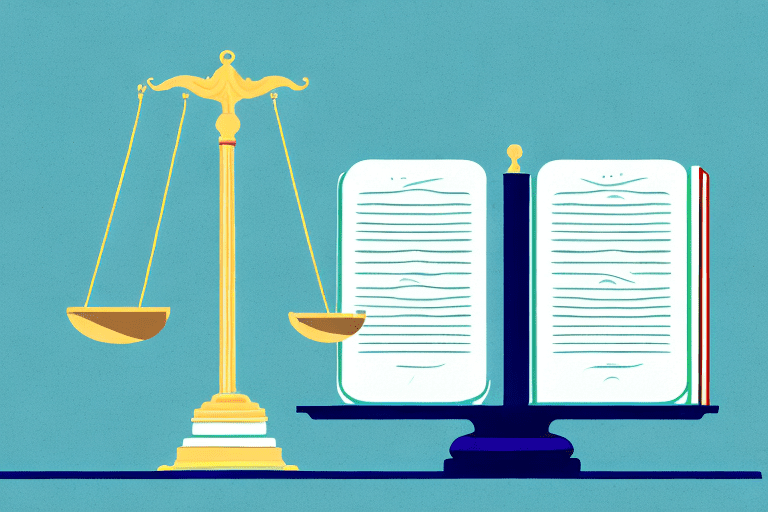The Patent Bar Exam is a rigorous test that evaluates candidates’ knowledge and understanding of patent law and regulations. Whether you’re a law student or an experienced professional in the field, passing this exam is essential for obtaining a patent attorney or agent license. In this article, we will guide you through the entire process, from understanding the exam to post-exam evaluation and tips for retaking the Patent Bar Exam.
Understanding the Patent Bar Exam
Overview of the Patent Bar Exam
The Patent Bar Exam, officially known as the United States Patent and Trademark Office (USPTO) Registration Examination, is administered by the USPTO. The exam consists of multiple-choice questions that assess your knowledge of patent laws, rules, and procedures.
Comprising of two parts, the exam includes the morning session with 100 questions covering topics such as patentability, patent application process, and patent prosecution. The afternoon session, on the other hand, consists of 50 questions focused on ethics and professional responsibility.
Preparing for the Patent Bar Exam requires a comprehensive understanding of the various aspects of patent law. It is essential to familiarize yourself with the intricacies of patentability criteria, including novelty, non-obviousness, and utility. Additionally, a thorough grasp of the patent application process, from drafting claims to responding to office actions, is crucial for success.
Furthermore, a solid foundation in patent prosecution is necessary to navigate the complexities of interacting with patent examiners. Understanding how to overcome rejections and effectively argue for patentability is essential in ensuring the protection of inventors’ rights.
Importance of the Patent Bar Exam
The Patent Bar Exam is a critical step in establishing yourself as a qualified patent professional. Passing the exam demonstrates your competence in navigating the complex realm of patent law and ensures your ability to protect inventors’ rights effectively.
Obtaining a patent attorney or agent license opens up a world of opportunities in the field of intellectual property. With this license, you can represent clients before the USPTO, advocating for their inventions and innovations. This role allows you to play a pivotal role in shaping the future of technology and scientific advancements.
Moreover, passing the Patent Bar Exam showcases your dedication and commitment to your profession. It signifies your willingness to stay updated with the ever-evolving patent laws and regulations, ensuring that you can provide the highest level of legal counsel to your clients.
Additionally, a successful outcome in the exam enhances your professional credibility and increases your marketability in the patent law industry. It demonstrates your expertise and competence to potential employers, making you a desirable candidate for patent law firms, corporations, and research institutions.
Furthermore, the Patent Bar Exam serves as a benchmark for maintaining the integrity and quality of patent professionals. By setting a high standard for knowledge and ethics, the exam ensures that patent practitioners uphold the highest standards of professionalism and responsibility in their practice.
Preparing for the Patent Bar Exam
Preparing for the Patent Bar Exam requires careful planning and dedicated study. To ensure success, it is important to gather the essential study materials and employ effective study techniques. Additionally, managing your time effectively is crucial for thorough preparation.
Essential Study Materials
Start your preparation by gathering the essential study materials. These may include study guides, reference books, sample questions, and online resources. Familiarize yourself with the Manual of Patent Examining Procedure (MPEP), as it serves as a primary resource for understanding the patent examination process.
Investing in reputable patent bar review courses can also be beneficial. These courses offer comprehensive study materials and practice tests, providing structured study plans and valuable insights from experienced patent professionals.
Time Management Tips
Creating an effective study schedule plays a vital role in your success. Break down the study materials into manageable sections and allocate dedicated time to each topic. It’s essential to strike a balance between reviewing the content, answering practice questions, and taking breaks to avoid burnout.
Moreover, starting your preparation well in advance allows sufficient time for thorough revision. Procrastination can lead to unnecessary stress and hinder your performance on the exam day.
Effective Study Techniques
While studying, employ effective techniques to maximize your retention and understanding of the material. Active reading is a popular technique that involves engaging with the text by highlighting key points, underlining important sections, and taking concise notes.
Another useful technique is using mnemonic devices. Memory aids such as acronyms, visual associations, or rhymes can help you remember complex concepts and terminology.
Creating flashcards is another effective study technique. Flashcards can be used to review definitions, case law, and key patent statutes, allowing for quick and efficient revision.
Additionally, consider engaging in group study sessions. Collaborating with fellow candidates provides an opportunity to discuss challenging topics, solve practice questions, and share insights. This collaborative approach can enhance your understanding of the material and provide different perspectives.
By following these tips and techniques, you can effectively prepare for the Patent Bar Exam and increase your chances of success. Remember to stay focused, stay organized, and stay motivated throughout your preparation journey.
Exam Day Strategies
What to Expect on Exam Day
The key to performing well on the exam day is being prepared and familiar with the structure and format of the Patent Bar Exam. Review the examination guidelines provided by the USPTO and become acquainted with the directions and navigation features of the computer-based exam.
Arrive at the exam center early to allow ample time for check-in procedures. This will give you the opportunity to settle your nerves and get into the right mindset for the exam. Take a deep breath, stay calm, and approach each question methodically.
As you enter the exam room, you may notice a sense of anticipation in the air. The room is filled with other aspiring patent attorneys, all eager to showcase their knowledge and skills. The atmosphere is both nerve-wracking and exciting, as you know that this exam is a crucial step towards your career goals.
Managing Exam Stress
Feeling anxious before and during an exam is normal. To manage stress, practice relaxation techniques such as deep breathing exercises or visualization. Close your eyes for a moment and imagine yourself confidently answering each question with ease. Visualize success and let go of any negative thoughts or doubts.
Remember, stress can impair your concentration and hinder your performance. So, approach the exam with a clear and focused mind. Take a moment to remind yourself of the countless hours you’ve dedicated to studying and preparing for this moment. Trust in your abilities and believe that you are well-equipped to handle any challenge that comes your way.
As you sit down at your assigned computer station, take a moment to ground yourself. Feel the weight of the keyboard beneath your fingertips and the hum of the computer in front of you. Embrace the present moment and let go of any distractions or worries.
Time Management During the Exam
The Patent Bar Exam is time-pressed, so it’s crucial to manage your time effectively. Skim through the questions briefly before starting to answer them. This will give you an overview of what lies ahead and allow you to strategize your approach. Identify any questions that seem particularly challenging or time-consuming.
As you begin answering the questions, remember to pace yourself. It’s easy to get caught up in the pressure and rush through the exam, but this can lead to careless mistakes. Take a moment to read each question carefully and analyze the provided information. Break down complex scenarios into manageable parts and approach them systematically.
If you’re unsure about an answer, mark it for review and move on. Trust your instincts and don’t dwell on one question for too long. Utilize the time remaining at the end to revisit the marked questions and make educated guesses if necessary. Remember, sometimes the best answer is the one that you can confidently eliminate the others.
As the clock ticks down, stay focused and maintain a steady rhythm. Take short breaks if needed, but be mindful of the time. Keep a close eye on the remaining minutes and allocate your time accordingly. Stay calm and composed, knowing that you’ve prepared well and are capable of tackling any challenge that comes your way.
Post-Exam Evaluation
Interpreting Your Results
Once you complete the exam, your results will be available within a few weeks. Interpret your scores to identify your strong and weak areas. Understanding your performance can help you devise a plan for future endeavors or determine if a retake is necessary.
When analyzing your results, it is important to remember that the Patent Bar Exam is known for its challenging nature. Many individuals find that they have areas for improvement, even if they have performed well overall. Take the time to celebrate your achievements and reflect on the progress you have made. Recognize the effort and dedication you put into preparing for this exam.
As you review your scores, pay attention to the specific sections and topics that you excelled in. These areas can serve as a foundation for your future career as a patent attorney or agent. By identifying your strengths, you can focus on honing these skills and becoming an expert in those particular areas.
On the other hand, if you discover that you have weaknesses in certain subjects, do not be discouraged. Use this information as an opportunity for growth. Consider seeking additional resources or guidance to improve your understanding of those topics. Remember, even the most successful professionals have areas where they can enhance their knowledge and expertise.
Next Steps After the Exam
If you are successful in passing the Patent Bar Exam, congratulations! This accomplishment is a significant milestone on your journey to becoming a licensed patent attorney or agent. However, passing the exam is just the beginning of the next phase.
After receiving your exam results, you will need to complete the remaining steps required to obtain your license. This includes submitting an application for registration and paying the necessary fees. The process may vary depending on the jurisdiction you are in, so it is essential to familiarize yourself with the specific requirements of your region.
Once you have obtained your license, it is crucial to continue your professional development. Consider joining professional organizations such as the American Intellectual Property Law Association (AIPLA) or the Intellectual Property Owners Association (IPO). These organizations provide valuable resources, networking opportunities, and access to a community of experienced professionals in the field.
In addition to joining professional organizations, attending networking events can also be beneficial for your career. These events allow you to connect with other patent attorneys, agents, and industry experts. Building a strong professional network can open doors to new opportunities, collaborations, and mentorship.
Furthermore, staying updated with evolving patent laws and industry trends is essential to maintaining your expertise. The field of intellectual property is constantly evolving, and it is crucial to stay informed about the latest developments. Consider subscribing to industry publications, attending conferences, and participating in continuing education programs to ensure you are up to date with the latest advancements in patent law.
Remember, passing the Patent Bar Exam is a significant achievement, but it is only the beginning of your journey as a patent attorney or agent. Embrace the opportunities that lie ahead and continue to strive for excellence in your career.
Tips for Retaking the Patent Bar Exam
Analyzing Your Previous Attempt
In the case of an unsuccessful attempt, use it as an opportunity for growth and improvement. Analyze your performance, paying close attention to weak areas. Identify the topics that require further study and develop a targeted study plan to address these areas.
Review your exam experience and evaluate factors that may have contributed to a lower score. This analysis will help you approach the retake with newfound awareness and effectiveness.
Adjusting Your Study Plan
When retaking the Patent Bar Exam, refine your study plan and incorporate additional study materials, different techniques, or seek guidance from mentors or tutors. Consider investing more time in your weaker areas while maintaining a comprehensive approach.
Understand that each candidate’s experience is unique, so adjust your study plan to suit your learning style and needs. Reinforce your understanding through continued practice with sample questions and mock exams.
Maintaining Motivation and Focus
Preparing for the Patent Bar Exam requires persistence and dedication. Stay motivated by setting achievable goals and rewarding yourself upon reaching milestones. Surround yourself with a supportive network of friends, family, or fellow candidates who can provide encouragement and guidance.
Remember, success often comes with perseverance. Stay focused on your desired outcome and visualize yourself passing the Patent Bar Exam with confidence.
Conclusion
Passing the Patent Bar Exam is a significant accomplishment that opens up opportunities for a successful career in patent law. By understanding the exam structure, implementing effective study techniques, and preparing diligently, you can enhance your chances of passing the exam and securing your license. Remember, persistence, self-reflection, and continuous improvement are key to achieving your goal of passing the Patent Bar Exam.











